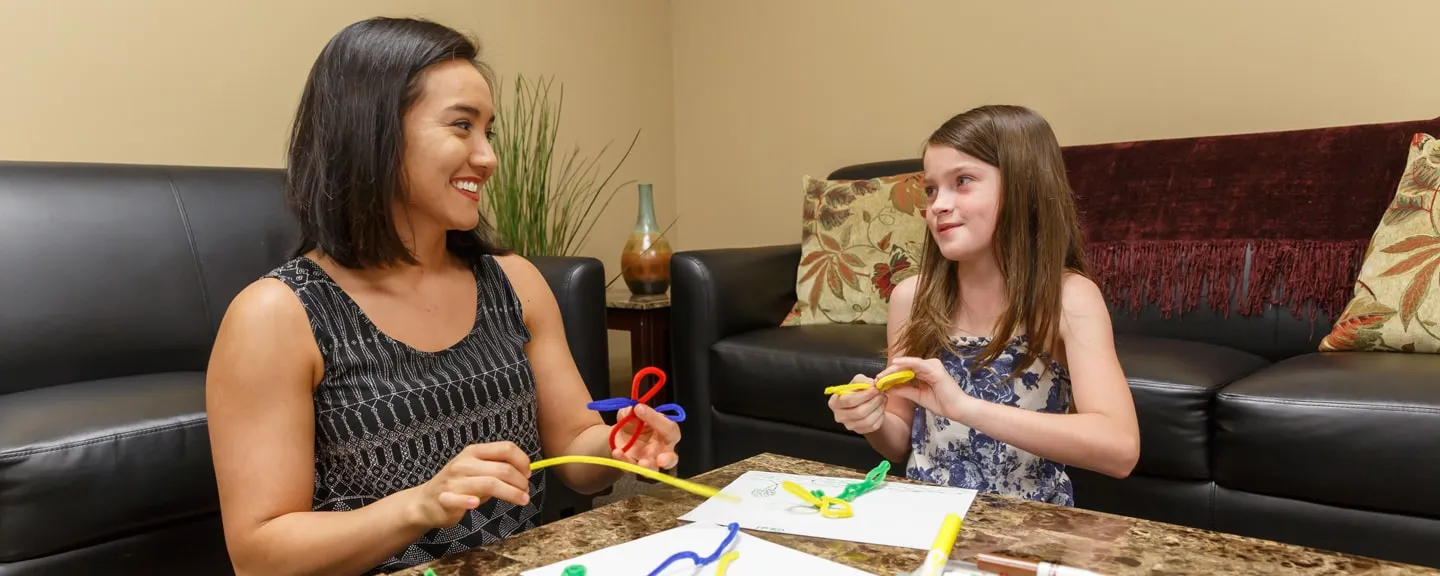- Home
- >
- APU Articles
- >
- News Article
Child Life and Counseling Psychology Programs: What’s the Difference?
February 07, 2019 | Written By Naomi Mannino

According to Kathryn Ecklund, PhD, chair and professor for the Department of Psychology at APU, the Child Life career track is more focused on clinical environments, equipping students to support children in hospital and healthcare settings who are facing medical crises and situations. Meanwhile, the Counseling Psychology career path prepares students for licensure (becoming a Licensed Professional Clinical Counselor, or LPCC) and is geared toward those who want to work with children and focus on mental health as well as counseling opportunities.
Do these characteristics align with a profession you’re interested in pursuing? Here’s a deeper dive into the differences between the Child Life and Counseling Psychology graduate programs, which can help you see where your interests and skills lie.
An Overview of the MS in Child Life Program
The Master of Science in Child Life graduate program at Azusa Pacific University specifically aims to prepare professionals to work with children and families who are impacted by health conditions and crises. Child Life professionals work specifically in medical settings or medically-related facilities—such as respite care, rehabilitation, or specialized camps—to provide psycho-social support to children impacted by a medical crisis. This can include such situations as cancer diagnosis and treatment, a traumatic injury, or another medical diagnosis. Accordingly, students are provided with training that’s focused on medical care contexts and diagnoses.
Those who seek this career path are often comfortable in medical settings. They work to support families in medical and situational crises with compassion, empathy, and patience, as these circumstances can be difficult to navigate for everyone involved.
Dr. Ecklund advises that students who plan to pursue careers in Child Life must also possess a strong ability (and desire) to tolerate the distress associated with the existential crisis of children dying. Additionally, they must be able to therapeutically and compassionately support the grieving process for families facing the loss of a child.
Elements of the MS in Counseling Psychology Degree
The Master of Science in Counseling Psychology with Specialization in Children and Adolescents program differs greatly in that it prepares professionals to work with children affected by mental health, behavioral health, and other developmental and psychiatric conditions. These professionals work in a variety of contexts, which include mental health clinics, community mental health settings, private practice settings, residential and specialized educational mental healthcare settings, and other out-patient facilities. They are specifically trained in the diagnosis and treatment of mental health, behavioral health, and developmental concerns.
Professionals who complete the MS in Counseling Psychology program with a specialization in children and youth will be prepared to pursue licensure as a Licensed Professional Clinical Counselor. This enables them to function as independent mental health professionals in California and 48 other states.
According to Dr. Ecklund, if you are pursuing a psycho-social therapeutic career with children and youth, you likely possess certain characteristics. These include the ability to experience and express enjoyment, respect, and empathy for children; to play unselfconsciously with children; and to “translate” complex, abstract ideas into developmentally appropriate language a child or youth could understand. In addition, it’s crucial to exhibit strong caregiving instincts as well as flexibility and creativity.
The Importance of Addressing Children’s Needs
People who pursue careers in counseling children with mental health, behavioral health, and developmental disorders must possess a strong ability to manage dysregulated behavior in children. They need to be caring yet therapeutically effective in the face of distress experienced by families and children displaying emotional and behavioral symptoms, which can be difficult to regulate. Ultimately, it’s easy to see the difference that these professionals have in their subjects’ lives.
Individuals pursuing this career path may choose to work toward one or both of the Child Life and Counseling Psychology graduate programs. Students who choose to enroll for both the Licensed Professional Clinical Counselor and Child Life Certification program will be prepared to work in all settings in which children are served for medical, mental, and behavioral health, as well as other developmental or crisis situations.
Are you hoping to work in the field of child psychology? Learn more about the graduate programs available within APU’s Department of Psychology, as well as its many undergraduate offerings.